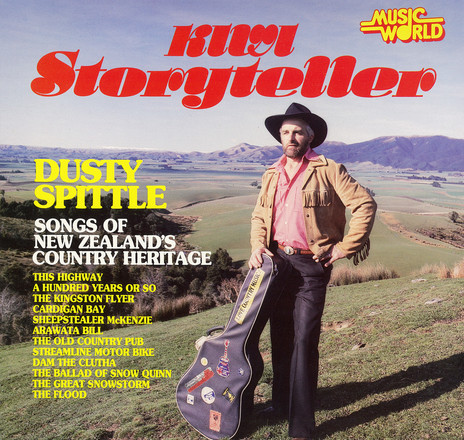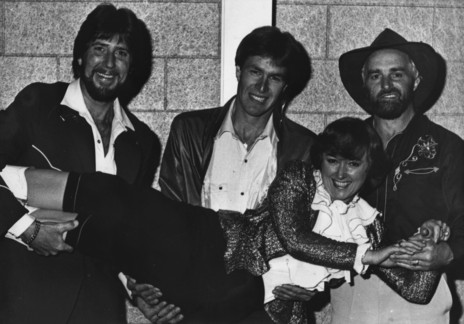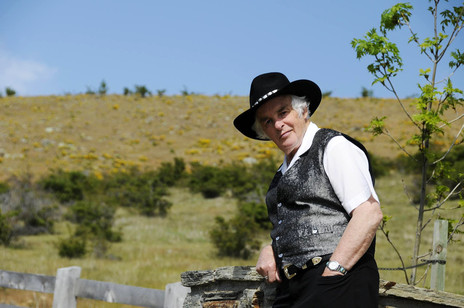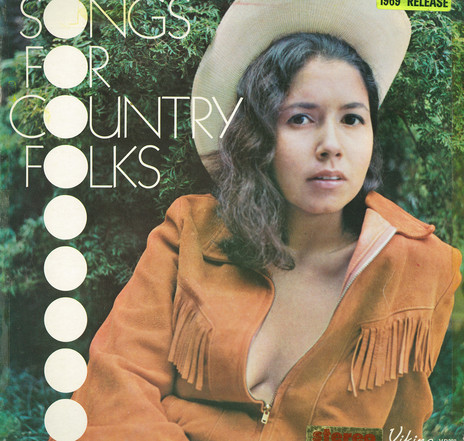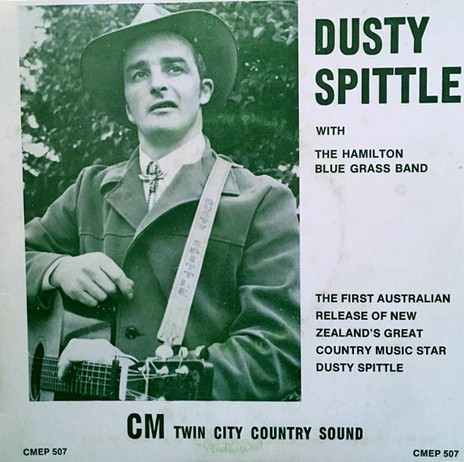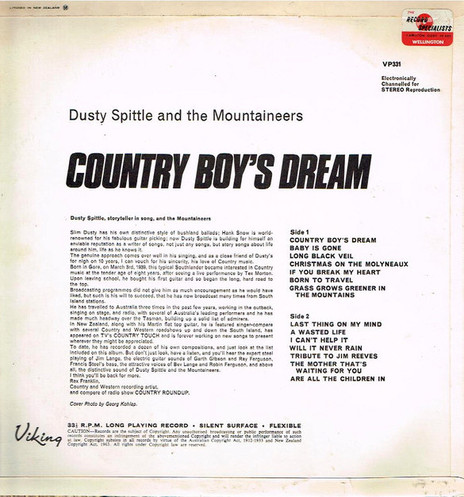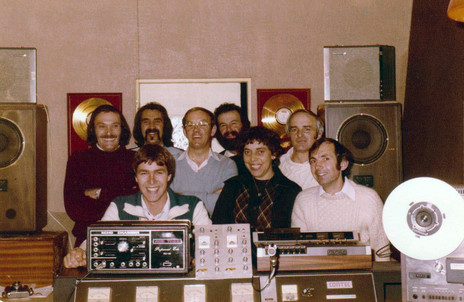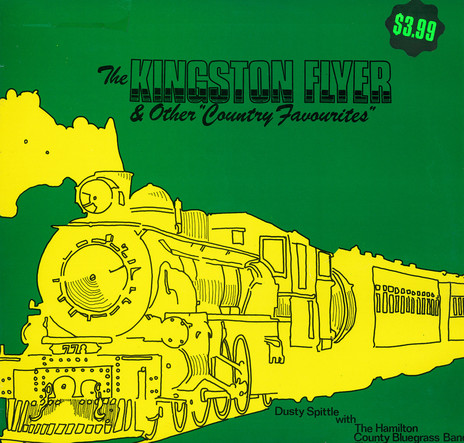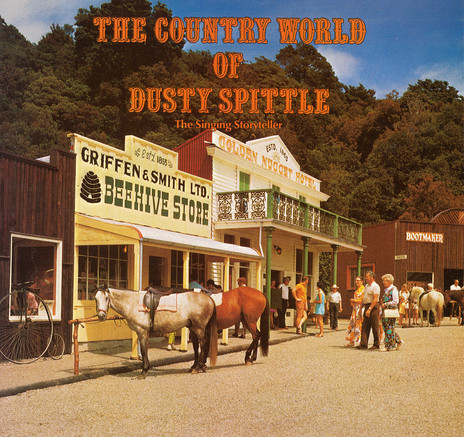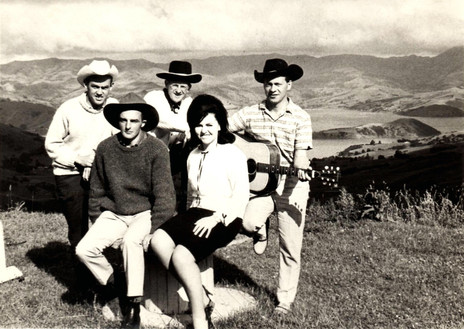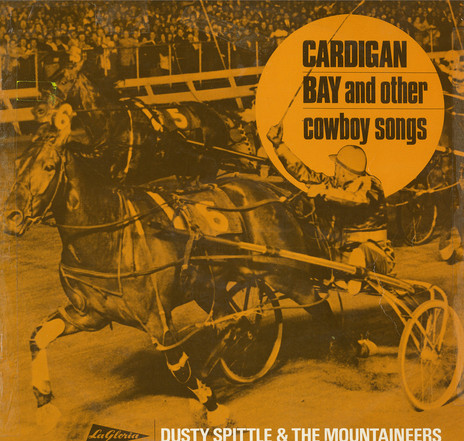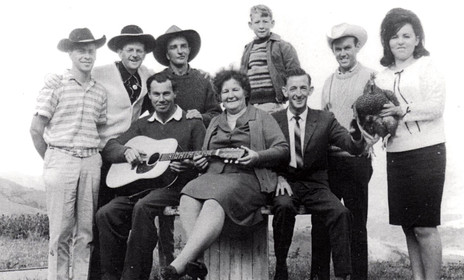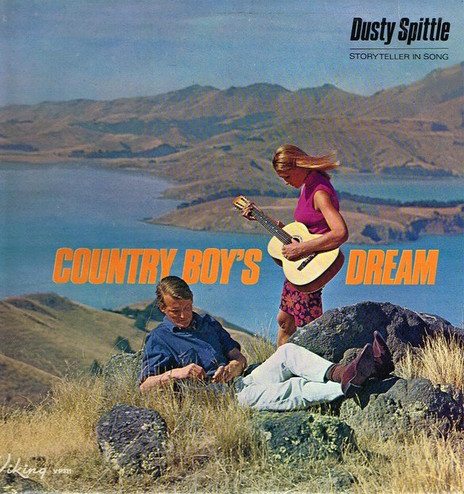In 1992 Spittle cheated death when he underwent brain surgery to remove a rare colloid cyst. The ordeal resulted in temporary memory loss, however he slowly regained his confidence and was back in the saddle a few years later after much encouragement from wife Fay. When he recovered, he and Fay travelled the country in a motor home, stopping to perform at country music clubs.
But he suffered a stroke in November 2018 and was admitted to Dunstan Hospital in Clyde. There he fell from his bed and broke a hip, which was operated on in Dunedin. He developed pneumonia and was transferred back to Clyde but never recovered. Dusty Spittle passed away at the age of 79 on December 8, 2018.
He had still been performing around Southland until falling ill and had surprised Warratahs frontman Barry Saunders in mid-October by showing up at the Captain Cook Tavern in Dunedin on the band’s 30th anniversary tour.
A prolific songwriter with around 300 titles to his credit, Spittle’s songs found particular favour with Australian bush balladeers and were included on records by “Yodelling Sweetheart” Shirley Thoms, Johnny Greenwood, Reg Poole, Gordon Parsons and Buddy Williams. Back home, singers such as long-time friend Max McCauley, John Hore and folkie Phil Garland covered him.
“I haven’t got a great imagination, so I had to take things that I’d seen and try and write about them,” Spittle once told Newstalk ZB radio personality Jim Sutton on his Nostalgia Show.
Among his originals were songs such as ‘Arawata Bill’, ‘The Mighty Clutha River’, ‘Sheep Stealer Mackenzie’, ‘The Kingston Flyer’, ‘The Traveller’, ‘Christmas On The Molyneux’ and his best-known ‘Cardigan Bay’ about the world-famous Southland trotter of the same name.
Spittle was one of only three people to appear on both New Zealand television’s first dedicated country music series, The Country Touch, in the late 1960s and on its last, Dixie Chicken, the doomed show that was pulled from the air after just one episode in 1987. The others were Brendan Dugan and guitarist Gray Bartlett.
When host Andy Anderson back-announced Spittle on Dixie Chicken as “the grand old man of New Zealand country music” and asked his age, Spittle’s deadpan reply was, “I turned 60 yesterday.” He was in fact 48 at the time.
Spittle was part of the team that set up the New Zealand Gold Guitar Awards in Gore.
Spittle toured in Australia with Rick and Thel Carey and Buddy Williams in the 1970s and worked on the establishment of the Hands of Fame in the country music capital Tamworth. His handprints were preserved in cement there in 1986, eight years before being included in the Gore Hands of Fame. He was even inducted into America’s Old Time Country Music Hall of Fame in Anita, Iowa.
With Max McCauley, Spittle was part of the team that set up the New Zealand Gold Guitar Awards in Gore. When their Country Style Promotions was wound up after a final show in the Green Island Hall in Dunedin in 1970, the money was put into a trust which the Gore Country Music Club used to get the Gold Guitar Awards up and running in 1974.
The inaugural Gold Guitar winner was Patsy Riggir, who would go on to become one of the nation’s biggest country music stars. But she was a 28-year-old checkout girl when she first met Dusty Spittle that year in Gore.
Although they worked in different styles within country music, Riggir was grateful for his support and regular Christmas greeting. “He was a delight,” she told AudioCulture in January 2019. “Just so full of respect for New Zealand country artists and wanted to help as much as he could. He was a genuine country gentleman.”
Spittle was responsible for giving many New Zealand artists their break in Australia on his New Zealand Showcase at the Tamworth Country Music Festival. Those who benefited from appearances included Eddie Low, Gentle Annie, Jeff Rea, Michael Roycroft, Jan Cooper and The Warratahs. “It became a platform for launching a lot of careers [in Australia],” recalled Roycroft.
Singer-songwriter Jeff Rea was a Gore teenager when he met Spittle at the end of the 1970s. “One thing led to another and Dusty asked me to play guitar on his next album [Kiwi Storyteller], which was to be recorded at Tandem Studios in Christchurch,” Rea said. “This was a big deal for me as I considered him then, as I do now, the real deal. This was the start of a life-long friendship.”
From the mid-1980s to the mid-1990s, Rea was based in Nashville writing with and bandleader for American country star Gary Morris, but he never forgot the start Spittle had given him in the studio and in Tamworth or the encouragement of his songwriting.
“Dusty was a true country gentleman; a man who overcame adversity and one who wrote songs that will be remembered as part of our heritage. His songs were a mirror of life as he saw it, always written with an honesty as true as the man himself. While I have lost a friend with his passing, the country music community has lost a legend.”
Warratahs bass guitarist Clinton Brown remembered working in Tamworth and Gore with Spittle. “He was great to work with. One never quite knew where the song was going. He told great yarns; there was some video footage where he introduced The Warratahs one by one with a nickname he’d made up for each of us. A lovely man with a great, very dry sense of humour.”
The eldest of four, Dusty Spittle was born Harold Ian Spittle in Gore on March 3, 1939. Born without a right ear or eardrum, he didn’t go to school until he was seven. He spent 12 years in and out of hospital while doctors fashioned an ear from a skin graft from his shoulder.
At about nine years old, Spittle went to a Tex Morton show. It set the course for his life.
When he was about nine, Spittle’s father took him to a Tex Morton show that set the course for his life. “I never got over that concert. He was my hero when I was a boy,” Spittle told Jim Sutton on radio. He met Morton in the late 1960s when he was a guest on The Country Touch TV show, which Morton hosted, and even recorded a song called ‘Old Tex Morton Was A Boyhood Hero Of Mine’.
“It was recorded in Australia on a mixed artists’ EP and Tex was asked to write the cover notes,” Spittle continued. “He was quite amused by it. I ran into him again in Australia later on. He became quite a good mate for a while.”
Spittle left Otago Boys’ High School in 1955 to work on the family sheep farm. He met Max McCauley in a Gore music shop where both were buying new guitars. As they improved they picked up work wherever people would listen, from rodeos to rest homes. He introduced McCauley to guitarist Garth Gibson and they started The Mountaineers.
In 1962, Spittle and mandolin-playing friend Ron Cavanagh took off to Australia for six months to find like-minded musicians. As The Sunlanders, they performed live on Tasmanian radio stations 7BU Burnie and 7LA Launceston and Victoria’s 3HA Hamilton and 3SR Shepparton.
It was a Tasmanian DJ who opined that Ian Spittle wasn’t a very country name. So Spittle rechristened himself Dusty Miller after the silvery plant of the same name his mother was fond of. While picking beans in Tasmania he wrote his first song when local woman Violet Swan asked him to put a melody to her poem ‘Shake Hands With Your Brother Again’.
Back on the farm in Gore, he dropped the Miller surname and became Dusty Spittle, teaming up again with Max McCauley. Spittle joined The Mountaineers as rhythm guitarist and the band formed Country Style Promotions, putting on shows around Southland and Otago.
Spittle’s recording career happened by accident at a session for McCauley in Gibson’s implement shed/studio in Kelso. During a break, one of the musicians suggested Spittle sing Johnny Bond’s ‘The Fool’s Paradise’. The tape had continued running and when McCauley & The Mountaineers’ She Taught Me To Yodel EP was released on Viking Records in 1966, Spittle’s impromptu appearance was track number two.
Spittle’s recording career began in an implement shed/ studio in Kelso, Southland.
A year later, Dusty Spittle & The Mountaineers’ Cardigan Bay And Other Cowboy Songs was one of the last albums released on La Gloria Records before it was absorbed into its parent label Viking. An uncle suggested the album’s title track when Spittle told him he was out of songwriting ideas.
The EP The Traveller And Other Songs and LPs Songs For Country Folks and Country Boy’s Dream followed on Viking, mostly recorded at radio station 4ZA in Invercargill, and Spittle made further trips across the Tasman, touring with Australian institutions Rick and Thel Carey and then Buddy Williams.
Williams was the first Australian to record country and western music in Australia, after New Zealand’s Tex Morton had done it there. He would record several of Spittle’s songs, one of which, ‘They Wouldn’t Have A Clue’, was written from a conversation an old Western Australian drover had with Spittle and Williams about the young blokes coming through.
When Spittle finally put it on one of his own albums he was denied entry in the Golden Guitars in Tamworth. Organisers had changed the name from the Australasian Country Music Awards and barred entries from New Zealand after Patsy Riggir’s five Golden Guitar wins during the 1980s.
“I was disappointed because I felt that I finally had the song and the sound that would suit the Tamworth thing and they wouldn’t take it on,” Spittle told Jim Sutton. “I reckon I was talking a piece of Australian history that day.” However, at another event Spittle did win what he believed was the only bush ballad award to come outside of Australia, for ‘The Boy From Dorrigo’, written about Buddy Williams.
In 1971, Dubbo label CM Twin City Sound released the EP Dusty Spittle With The Hamilton Blue Grass Band, recorded with members of The Hamilton County Bluegrass Band who had relocated to Sydney earlier that year. The liner notes in part read, “Dusty came to Australia several years ago. During his stay here he did a tour of Western New South Wales. Ever since, people have tried to buy Dusty’s recordings and we are very proud to have Dusty release his first Australian recording.”
Spittle had a long association with the Tamworth Country Music Festival that started in the early 1970s. In late 1976 he joined 2TM radio announcer John Minson and station manager Max Ellis to pull up the flowerbed at CWA Park for the installation of the Hands Of Fame. The following January, Spittle’s hero Tex Morton was among the first inductees, as was New Zealand teenager Suzanne Prentice.
The park was also the first location for what would become Spittle’s New Zealand Showcase at the festival. Having noticed a lot of his fellow countrymen with nowhere to sing he asked radio station 2TM if the Kiwis could perform at a walk-up show at the Hands of Fame.
It was a success and 2TM suggested relocating to the Tamworth Town Hall before the show found a permanent home at the Tamworth Services Club until 1992. It ended after Spittle was diagnosed and then operated on for a rare cyst on the brain.
Spittle launched the New Zealand Showcase event at the Tamworth Country Music Festival.
“I was sick,” he later told Jim Sutton on the Nostalgia Show. “I paid someone else to put up posters. Hardly any were placed and we only got about half a club full of people. The show petered out and died. It was a shame because it had a great name.
“I introduced Eddie Low into Tamworth. They hadn’t thought he was country enough before that. Had people like Michael Roycroft, The Warratahs. Michael Roycroft stayed there. I took good entertainers. We represented New Zealand and really did have a good name.”
In New Zealand in the 1970s and 1980s Dusty Spittle released The Kingston Flyer & Other Country Favourites (on Hoghton Hughes’ Wells Fargo label), The Country World Of Dusty Spittle (Viking), Kiwi Storyteller (Music World) and a duet album with then wife Merelda, The Cowboy And The Rose. In the early 1990s came Rodeo Ballads And Sad Country Songs and Roses And Crystal, both released on cassette by Kiwi Pacific.
In 2008, his album What Would I Be Without You was named the best traditional country album of the year at the US Rural Roots Music Commission International. The same year, Dusty and Fay Spittle were inducted into America’s Old Time Country Music Hall of Fame and Dusty ran a songwriting workshop at the Old Time Country and Bluegrass Music Festival in Le Mars, Iowa.
He recorded his 2011 album Dusty Country in two days at Roger and Gillian Chilton’s home studio in Invercargill. As well as some of his own songs, it featured material by Tom T. Hall, Johnny Cash and Hank Williams. On its release, Spittle told the Southland Times, “To sell records in New Zealand you have to do a certain amount of cover songs, which is a bit tragic if you’re a songwriter.”
Most of Spittle’s 1960s and 1970s records were made with The Mountaineers – guitarists Garth Gibson and Ray Ferguson and bassist Francis Steel – the band Spittle took over from his dear friend Max McCauley.
When news broke of Dusty Spittle’s death on December 8, 2018, McCauley posted on his own Facebook page that he was now the last living member of the two bands the friends had been in. “But I sure have a great lot of memories I carry with me,” he wrote.
“My heart is very heavy, hearing the sad news that one of my oldest musical friends passed away. Dusty and I started out together in music back when we were teenagers. We have had an enduring mutual respect and friendship over the years and I thoroughly enjoyed entertaining alongside him.
“It will be strange not to have him ring me, or to see him and Fay when they would call in for a yarn, as they often did. We had some great times together singing and playing. I sure will miss you, Ian (Dusty).”
